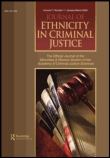
Journal of Ethnicity in Criminal Justice
Scope & Guideline
Delving into the Impact of Ethnicity on Criminal Justice.
Introduction
Aims and Scopes
- Intersections of Race and Criminal Justice:
The journal emphasizes research that examines how race and ethnicity impact experiences within the criminal justice system, including policing, sentencing, and victimization. - Impact of Socioeconomic Factors:
It investigates how socioeconomic status intersects with race and ethnicity, influencing public perceptions, victimization rates, and interactions with law enforcement. - Community Dynamics and Law Enforcement:
Research focusing on community responses to policing, community trust, and the implications of public attitudes toward law enforcement is a core area of interest. - Policy Analysis and Reform:
The journal aims to contribute to discussions on policy reforms aimed at addressing racial disparities and improving outcomes for marginalized communities within the justice system. - Cultural Contexts:
It highlights the importance of cultural factors in understanding crime, victimization, and the functioning of the criminal justice system, particularly among diverse ethnic groups.
Trending and Emerging
- Impact of Social Movements:
Recent publications focus on the effects of social movements (e.g., #MeToo, Black Lives Matter) on public perceptions of justice and policing, highlighting the role of activism in shaping discourse. - Racial Bias in Law Enforcement:
There is a growing body of research examining racial bias in law enforcement practices, including policing tactics and sentencing disparities, which is increasingly relevant in today's social climate. - Intersectionality in Victimization:
Emerging studies are exploring intersectionality, particularly how overlapping identities (e.g., race, gender, age) affect victimization risks and experiences within the justice system. - Community Trust and Policing:
Research on community trust in law enforcement and the implications for crime prevention strategies is gaining importance, reflecting broader societal concerns about police-community relations. - Cultural Competence in the Justice System:
There is an increasing emphasis on the need for cultural competence in law enforcement and judicial processes, recognizing the diverse backgrounds of individuals within the criminal justice system.
Declining or Waning
- Traditional Crime Measurement:
Research centered on conventional crime statistics and measurement techniques has seen a decline, as newer methodologies that incorporate qualitative data and community perspectives gain traction. - Generic Studies on Crime Rates:
Studies focusing solely on generic crime trends without specific racial or ethnic implications are less frequently published, indicating a shift toward more nuanced analyses. - Overgeneralization of Racial Issues:
There is a waning interest in studies that generalize racial issues without considering intersectionality, as the field moves towards more complex understandings of identity and its impact on criminal justice. - Focus on Single Ethnic Groups:
Research that focuses exclusively on a single ethnic group, without comparative analysis or consideration of intersectionality, appears to be decreasing, reflecting a move towards more comprehensive studies. - Historical Contexts of Crime:
The emphasis on historical analyses of crime, while still relevant, seems to be overshadowed by contemporary studies that address current issues in the criminal justice system.
Similar Journals

International Journal of Criminal Justice Sciences
Connecting researchers to contemporary issues in justice.The International Journal of Criminal Justice Sciences is a premier academic publication dedicated to advancing the field of criminal justice through rigorous research and innovative scholarship. Published by MANONMANIAM SUNDARANAR UNIVERSITY in India, this Open Access journal has been a vital platform for researchers since 2006, promoting unrestricted access to critical knowledge and insights in the realm of law and criminal justice. With a commendable Scopus ranking of #379 out of 1025 in the Social Sciences - Law category, placing it in the 63rd percentile, it holds an essential position for those engaged in legal studies. The journal is particularly beneficial for academics, practitioners, and students aiming to explore contemporary issues, innovative practices, and theoretical advancements in the discipline. Its commitment to quality research is reflected in its Q3 Quartile designation and the continuous convergence of research contributions anticipated from 2017 to 2024. Whether you are looking to publish your findings or seek valuable insights from peer-reviewed articles, the International Journal of Criminal Justice Sciences remains an indispensable resource for fostering knowledge and dialogue in this critical field.

Journal of Experimental Criminology
Innovating Insights into Criminal BehaviorThe Journal of Experimental Criminology, published by Springer, stands as a beacon of innovation within the realm of criminology and legal studies. With an ISSN of 1573-3750 and E-ISSN 1572-8315, this esteemed journal, based in the Netherlands, explores groundbreaking research and experimental approaches to understanding criminal behavior and justice systems. It proudly resides in the elite Q1 quartile of the law category for 2023, ranking an impressive #37 out of 1025 in Scopus within the Social Sciences _ Law domains, placing it in the 96th percentile among its peers. The journal's objectives are aimed at disseminating high-quality empirical research that informs policy and practice, making it an essential resource for scholars, practitioners, and students who strive to enhance the efficacy of crime prevention and criminal justice interventions. With coverage spanning from 2005 to 2024, the Journal of Experimental Criminology invites contributors from diverse backgrounds to engage in the interdisciplinary dialogue that shapes the future of criminological research.
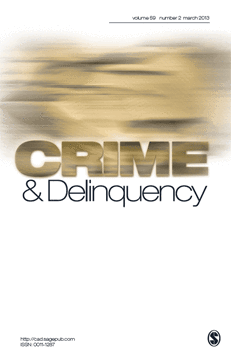
CRIME & DELINQUENCY
Unraveling the intricacies of crime and delinquency.CRIME & DELINQUENCY, published by SAGE PUBLICATIONS INC, is a premier journal dedicated to advancing the study of criminology and criminal justice. With an esteemed ISSN of 0011-1287 and E-ISSN 1552-387X, this influential journal has been a vital resource since its inception in 1955, continuing to engage in rigorous research and discourse through to 2024. Recognized with a Q1 ranking in both Law and Pathology and Forensic Medicine, CRIME & DELINQUENCY boasts an impressive Scopus ranking, placing it in the top 8% of journals in Social Sciences - Law and the top 31% in Medicine - Pathology and Forensic Medicine. This journal serves as an essential forum for researchers, professionals, and students to explore pressing issues related to crime, delinquency, and their societal implications. Although not an open-access journal, it offers a valuable repository of insightful research and analysis that informs practices and policies within the field. To stay abreast of the latest findings and contribute to the ongoing discourse, CRIME & DELINQUENCY is a must-read for all committed to understanding and addressing criminal behavior in society.

American Journal of Criminal Justice
Elevating Scholarly Discourse on Justice IssuesAmerican Journal of Criminal Justice is an esteemed publication within the realm of law and criminal justice, recognized for its significant contributions to the understanding and advancement of this vital field. Published by Springer, the journal has established itself as a leading platform for rigorous academic research and scholarly discourse since its inception in 1975. With its impressive 2023 Q1 ranking in the Law category and its 98th percentile ranking in Scopus among social sciences, the journal showcases cutting-edge research that addresses pivotal issues in criminal justice. Though it does not offer open access, its wealth of content is accessible to academic institutions and professionals seeking to deepen their knowledge. The journal aims to foster interdisciplinary collaboration and to provide a forum for innovative methodologies, policy evaluations, and theoretical perspectives, making it a critical resource for researchers, practitioners, and students dedicated to the evolution of criminal justice.

Journal of Criminological Research Policy and Practice
Transforming Policy through Cutting-Edge Criminological StudiesJournal of Criminological Research Policy and Practice is a pioneering platform dedicated to the exploration and dissemination of knowledge in the interdisciplinary field of criminology. Published by Emerald Group Publishing Ltd, this journal features high-quality research that addresses contemporary issues and innovative practices in areas such as law, public administration, and social psychology. With an ISSN of 2056-3841 and an E-ISSN of 2056-385X, the journal has garnered a notable presence in the academic community, showcasing a Q3 ranking in Law and Sociology & Political Science as of 2023. The journal provides valuable insights for researchers and practitioners alike, advancing the discourse on criminological policy and its implications for society. It serves as an essential resource for those invested in enhancing social justice, informing policy-making, and understanding the complexities of crime within a broader social context. Encompassing research from 2015 to the present and extending into 2024, the journal stands as a critical reference point for future studies and professional practice in criminology.

Asian Journal of Criminology
Advancing Criminological Discourse Across Asian BordersAsian Journal of Criminology, published by SPRINGER, stands as a pivotal platform for scholarly communication within the field of criminology, boasting a notable impact factor and achieving a distinguished Q1 ranking in Law for 2023. Located in the Netherlands, this journal addresses the complexities of crime and justice in Asian contexts, fostering interdisciplinary discourse between researchers, practitioners, and policymakers. Since its inception in 2006 and continuing through to 2024, the journal has published a range of high-quality articles that explore theoretical frameworks, empirical research, and practical applications in criminology. Although the journal is not open access, it remains accessible through academic libraries and institutions, ensuring its wide reach among scholars and students. With a Scopus ranking of 143 out of 1025 in the field of Social Sciences Law, placing it in the 86th percentile, the Asian Journal of Criminology is essential for anyone looking to stay at the forefront of criminological research and its application in diverse societal contexts.

Crime and Justice-A Review of Research
Advancing the discourse on crime and justice.Crime and Justice: A Review of Research is a leading scholarly journal published by the University of Chicago Press, dedicated to advancing knowledge in the fields of sociology and political science, specifically through the lens of crime and justice studies. With an ISSN of 0192-3234 and an E-ISSN of 2153-0416, this academic journal offers a distinguished platform for researchers, practitioners, and students to explore contemporary issues, methodologies, and theoretical advancements within the domain. Ranked in the Q2 category for both sociology and political science as of 2023, it has gained recognition with an impressive Scopus rank of #150 out of 1466 in its field, placing it in the 89th percentile. The journal publishes comprehensive reviews and research articles that inform best practices and policies in crime prevention, law enforcement, and social justice, fostering a deeper understanding of the complexities surrounding crime and societal responses. Though it is not an open-access journal, the insightful research it presents is indispensable for academic discourse and practical application in addressing the multifaceted challenges of crime and justice in contemporary society.
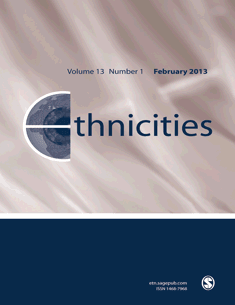
Ethnicities
Unraveling the Complexities of Race and IdentityEthnicities is a leading academic journal published by SAGE Publications Ltd, dedicated to exploring the complex dynamics of ethnicity, cultural identity, and social interactions within diverse communities. Since its inception in 2001, the journal has established a reputable position in the field of Cultural Studies, evidenced by its impressive Q1 ranking in the Cultural Studies category and Q2 ranking in Arts and Humanities (miscellaneous) as of 2023. With a Scopus ranking that places it in the top 8% of journals in Cultural Studies, Ethnicities aims to facilitate critical discourse, innovative research, and scholarly exchange related to ethnicity across global contexts. Researchers, professionals, and students interested in investigating the intricate intersections of race, identity, and social policy will find valuable insights within its pages. For further engagement and access to its comprehensive articles, the journal is available without Open Access options, serving as a vital resource for understanding contemporary issues in ethnicity and cultural relations.
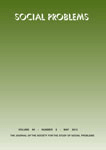
SOCIAL PROBLEMS
Engaging minds in the pursuit of solutions to social disparities.SOCIAL PROBLEMS, an esteemed journal published by Oxford University Press Inc, stands at the forefront of the sociology and political science fields. Established in 1973, this journal has evolved to become a key platform for advancing theoretical and empirical research on the pressing social issues of our time, spanning various critical topics such as inequality, crime, health disparities, and policy impacts. With an impressive 2023 impact factor placing it in the Q1 category for both sociology and political science, SOCIAL PROBLEMS is ranked #68 out of 1466 journals in its category, representing the top 95th percentile in Scopus rankings. While not an Open Access publication, the journal maintains a commitment to disseminating influential research and scholarship, enabling researchers, professionals, and students to engage with cutting-edge discussions and findings. For those passionate about understanding and addressing social challenges, SOCIAL PROBLEMS offers invaluable insights and a rigorous academic community.
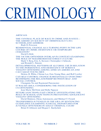
CRIMINOLOGY
Pioneering Research at the Intersection of Law and Medicine.CRIMINOLOGY, published by WILEY, stands as a leading journal in the fields of Law and Forensic Medicine, with an impressive impact factor that places it in the Q1 quartile for both categories. With its ISSN 0011-1384 and E-ISSN 1745-9125, this esteemed journal has been at the forefront of advancing knowledge and understanding in criminological theories and practices since its inception in 1963, and continues to be relevant through 2024. As of 2023, CRIMINOLOGY is ranked #19 in Social Sciences_ Law and #19 in Medicine_ Pathology and Forensic Medicine, positioning it within the top 2% of its field, making it an essential resource for researchers and professionals alike. Despite not offering open access, it provides invaluable insights into the complexities of crime, law enforcement, and societal impacts, thus shaping the future of criminological research and policy.